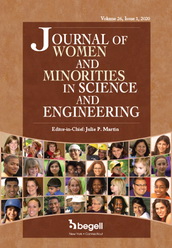
年間 6 号発行
ISSN 印刷: 1072-8325
ISSN オンライン: 1940-431X
Indexed in
DIFFERENTIAL EXPERIENCES OF WOMEN AND MINORITY ENGINEERING STUDENTS IN A COOPERATIVE EDUCATION PROGRAM
 Get access
Get access
要約
Although slight gains have been made in attracting women and minority students to the field of engineering, the differences are not great enough to meet current economic demands [National Academy of Sciences (2007). Rising above the gathering storm: Energizing and employing America for a brighter economic future, Washington, DC: National Academies Press]. Therefore, it has become imperative that colleges and universities increase efforts to both recruit and retain these students who express interest in the STEM fields [National Science Foundation (2006), Women, minorities, and persons with disabilities in science and engineering, NSF 4-311, Arlington, VA: NSF]. In engineering, one promising venue for students to gain professional experience as part of their undergraduate training is through cooperative education (co-op). However, there is a dearth of information in the research literature regarding how co-op programs can be structured to address the needs of diverse students. There is consensus, however, about one aspect of addressing the needs of diverse students, namely, mentoring and role models are key strategies for success. In this study, a mixed methods design was used to examine students' perceptions of mentoring in a cooperative education program in a southeastern university. Using Noe's [Noe, R. (1988). An investigation of the determinants of successful assigned mentoring relationships. Personnel Psychology, 1, 457−479] mentoring functions scales, which described psychosocial and career-related support, research findings indicated a statistically significant difference between gender and the psychosocial aspect of mentoring. Analysis of the qualitative data further confirmed differences in cooperative education experiences with respect to both gender and ethnicity.
-
Feldhaus Charles, Bentrem Kristin, STEM mentoring and the use of the principles of Adult Mentoring Inventory, International Journal of Mentoring and Coaching in Education, 4, 3, 2015. Crossref
-
Ramirez Nichole M., Main Joyce B., Fletcher Trina L., Ohland Matthew W., Academic predictors of cooperative education participation, 2014 IEEE Frontiers in Education Conference (FIE) Proceedings, 2014. Crossref
-
Male Sally A., Gardner Anne, Figueroa Eugenia, Bennett Dawn, Investigation of students’ experiences of gendered cultures in engineering workplaces, European Journal of Engineering Education, 43, 3, 2018. Crossref
-
Robnett Rachael D., Nelson Paul A., Zurbriggen Eileen L., Crosby Faye J., Chemers Martin M., The Form and Function of STEM Research Mentoring: A Mixed-Methods Analysis Focusing on Ethnically Diverse Undergraduates and Their Mentors, Emerging Adulthood, 7, 3, 2019. Crossref
-
McNeely Connie L., Frehill Lisa M, Assessing U.S. Minority Engineering Programs: Outline of a Research Agenda, SSRN Electronic Journal, 2011. Crossref
-
Liu Qin, Reeve Doug, Rottmann Cindy, Moore Emily, Examining Workplace Affordance and Student Engagement in Engineering Co-op and Internship Literature, Canadian Journal of Science, Mathematics and Technology Education, 20, 1, 2020. Crossref